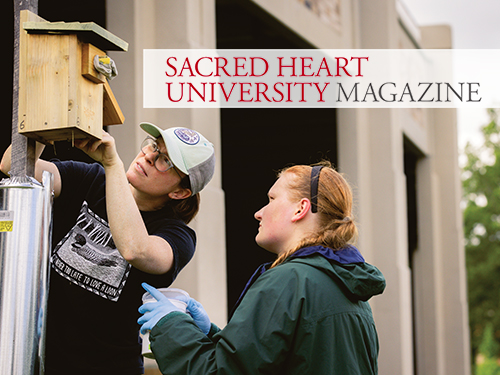
Minor in Biology
Inclement Weather: February 25, 2026
All classes starting prior to 11 a.m. will be remote. Classes after 11 a.m. will be in person. Non-essential staff should work remote until 11 a.m. then report to campus as scheduled.
Enhance your biological understanding with a minor in biology.
Required Courses | 23-24 credits
In addition to the following courses, you will need to take three biology courses at the 200 level or higher or consultation with a Biology advisor. BI 206/208 does not meet this requirement of one of the three Biology courses at 200 level, but BI 207/209 does.
BI 111 is the first foundational course in biology and provides an introduction to the molecular concepts that form the basis of cellular life. Concepts in Biology I covers the basic principles of evolution, biochemistry, cell structure and function, signal transduction, cell division, transmission genetics, the central dogma of molecular biology, and control of gene expression. Two 50-minute lectures and one 75-minute discussion/week. A prerequisite to BI 112, 201, 202, 205, 206, 212, and 230; PS 335, 350, 351, 352, and 353.
Prerequisite: Co: Take BI-113
BI 112 is the second foundational course in biology. The course focuses on the cellular and organismal levels in the hierarchy of biological organization. Concepts in Biology II covers adaptations of plant and animal life in an evolutionary context and includes discussion of development, body and tissue organization, homeostasis, energy yielding metabolism, nutrition, digestion, circulation, nutrient transport, and gas exchange. Two 50-minute lectures and one 75 minute discussion/week. A prerequisite to BI 201, 202, 210, 212, 230, 245, 255, 274, 276, 278, 305, and 345.
Prerequisite: Pre: BI-111 and BI-113
The laboratory associated with Concepts in Biology I focuses on multiweek exercises that reinforce critical concepts on the molecular and cellular levels of biological organization. The laboratory incorporates student-designed experiments, extensive journal-format scientific writing, and emphasizes science as a process. One 3-hour laboratory/week.
Prerequisite: Co: Take BI-111
The laboratory associated with Concepts in Biology II focuses on introduction of techniques for observing organismal physiology and behavior that reinforce critical concepts on the cellular and organismal levels of biological organization. The laboratory incorporates an open-ended multiweek student-designed experiment, extensive journal-format scientific writing, and emphasizes science as a process. One 3-hour laboratory/week.
Prerequisite: Pre: BI-111 and BI-113;
Explores modern theories of atomic and molecular structure, chemical bonding and periodic relations, chemical reactions and stoichiometry, states of matter, and solutions. Three 50-minute lectures and one 50-minute discussion per week. A prerequisite to BI 230 and CH 152.
Prerequisite: Take CH-153
Illustrates basic concepts presented in CH 151. Experiments include qualitative analysis of cations and anions, chromatography, synthesis, and FT-IR. One three-hour laboratory per week.
Prerequisite: Take CH-151
More Information
The Latest in Biology
View More News-
 AcademicsPublished:Connecting students with faculty research across the College of Arts & Sciences, the event fosters engagement, collaboration and academic discovery.
AcademicsPublished:Connecting students with faculty research across the College of Arts & Sciences, the event fosters engagement, collaboration and academic discovery. -

Student Excels While Competing for Team USA in Taekwondo
Student Spotlight & OutcomesPublished:Kasia Hanulewicz is pursuing the 3+3 Doctor of Physical Therapy program while competing internationally -

Learning to Fly
Academics, Faculty & Staff Spotlight, Student Spotlight & OutcomesPublished:A dedicated mentor's fast-growing research project gives students the chance to take wing as scientists.

